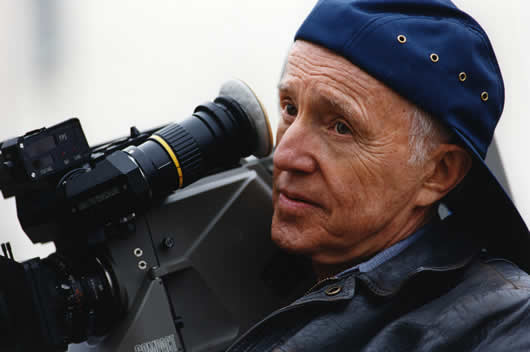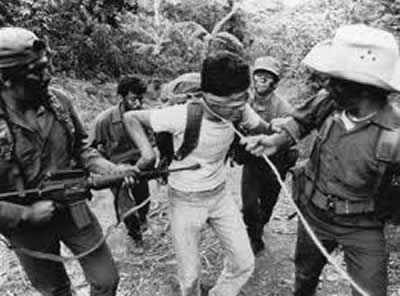 Haskell Wexler, the two time Academy-Award Winning Cinematographer (Who’s Afraid of Virginia Wolf, Bound for Glory) and three time Oscar nominee (One Flew Over the Cuckoo’s Nest, Matewan, Blaze), is a well-respected industry icon who suffers the same fate as any independent filmmaker: he anxiously awaits the release of his narrative feature shot in Nicaragua during the 80s. He has directed over a dozen films including Medium Cool, which has been selected for preservation by the United States National Film Registry and by the Library of Congress as being “culturally, historically, or aesthetically significant.” And despite Wexler’s credentials, he has waited 26 years for the Director’s Cut of his feature film, Latino, shot in 1984 during America’s secret war on Nicaragua, to finally see the light of day. The unseen cut of the film, a Lucas Film Production which was selected to premiere at the 1985 Cannes Film Festival as a selection in ‘Un Certain Regard’, will be released by Cinema Libre Studio on June 14, 2011 on DVD and digital platforms.
Haskell Wexler, the two time Academy-Award Winning Cinematographer (Who’s Afraid of Virginia Wolf, Bound for Glory) and three time Oscar nominee (One Flew Over the Cuckoo’s Nest, Matewan, Blaze), is a well-respected industry icon who suffers the same fate as any independent filmmaker: he anxiously awaits the release of his narrative feature shot in Nicaragua during the 80s. He has directed over a dozen films including Medium Cool, which has been selected for preservation by the United States National Film Registry and by the Library of Congress as being “culturally, historically, or aesthetically significant.” And despite Wexler’s credentials, he has waited 26 years for the Director’s Cut of his feature film, Latino, shot in 1984 during America’s secret war on Nicaragua, to finally see the light of day. The unseen cut of the film, a Lucas Film Production which was selected to premiere at the 1985 Cannes Film Festival as a selection in ‘Un Certain Regard’, will be released by Cinema Libre Studio on June 14, 2011 on DVD and digital platforms.
Wexler, chosen by the International Cinematographer’s Guild, to be one of film history’s ten most influential cinematographers, traveled into the war-torn country at the age of 63 without the approval of the U.S. State Department. One of his crew members turned out to be a plant by the CIA. Wexler was accompanied by a skeleton crew, which at times came under fire as they filmed in villages that had been recently attacked by Contra forces, with the vision of making a feature film that would expose the lies being told about the Sandinista-Contra conflict. “The main thing was that it was a secret war and a dirty secret…the U.S. always denied [involvement] saying that was just a civil war within Nicaragua,” said Wexler in a recent interview. “The reason I want the Director’s Cut to come out now is to say that the people in power in our country will pay to arm bad people (and have them go into) another country and kill their women and children and do it for a ‘good cause.’ And of course we’ve seen that in Iraq. We’re seeing that now in the Middle East. And that’s not what America is all about.”
The conflict in Nicaragua began in 1979 after the Sandinista National Liberation Front (FSLN), a socialist movement, ousted long-time dictator Anastasio Somoza. The Sandinistas instituted a policy of mass literacy, devoted significant resources to health care, and promoted gender equality. In 1981, after being elected president, Ronald Regan authorized the CIA to begin financing, arming and training rebels, most of whom were former members of Somoza’s National Guard, to counter the perceived Cuban-style “communist threat” posed by the Sandinistas. The counter-revolutionaries became known as the Contras and were trained in neighboring Honduras, engaging in guerrilla warfare aimed at ousting the Sandinistas forces in Nicaragua.
In 1984, the same year Wexler filmed Latino in Honduras and Nicaragua, the U.S. government pledged over $24 million to aid the Contras. Later that year, Congress prohibited federal funding of the militia group after the FSLN held democratic elections and American public opinion changed against support of the Contras. However, the Reagan administration continued to back the guerillas by raising money from allies abroad and more significantly, selling arms to Iran – then engaged in a war with Iraq – with proceeds funneled back to the Contras. This became known as the Iran-Contra Affair.
Latino stars Robert Beltran (“Eating Raoul” and television’s Star Trek: Voyager and Big Love) as Eddie Guerro, a Vietnam Vet from Los Angeles who is sent to help the U.S Special Forces train Contra rebels where he falls for Marlena, a local agronomist, played by Annette Cardona (best known for playing ‘Cha Cha’ in Grease) whose father is killed by the Contras. The verité-style film had a U.S. premiere at the Chicago International Film festival. Previous to Latino, Wexler, with Saul Landau, made a documentary titled Target Nicaragua. That adventure was background for the script that became Latino.
Wexler believed that making a dramatic film based on facts would break the veil of secrecy. At that time, the existence of a mercenary force called the Contras was ignored by the media. If any word came out challenging this avoidance, the State Department would dismiss it, saying the situation in Nicaragua was an internal dispute, a civil conflict– even though these military fighters were armed, paid for and advised by US forces.
The main characters in the film Latino are Los Angeles Chicanos, members of Special Forces based in Honduras, working with the Contras. Later, Ronald Reagan described these invading forces as the “moral equivalent of our Founding Fathers.” 
Wexler, who has been often lauded for his film work, but perhaps, is not as widely recognized for his long career as a peace activist, hopes that LATINO can have a significant impact today as a time capsule that demonstrates how America’s militarism has not changed, only the locations of our involvement. The desire to see a re-release at this stage in his career, as Wexler, age 89, stated in a recent interview: “is because of the concentration of military activity which is stealing from our country robbing from our schools, our parks, and our libraries. It’s also a due to this prevalent attitude of settling things through aggressive militarism, and the corporatization of our whole culture, including mercenaries, who are now euphemistically called ‘contractors.’ And the whole idea of cannon fodder, particularly now with recruiters targeting young unemployed guys from Latin American communities who are being enticed to join the military with promises that aren’t kept.”
The Director’s Commentary reveals how a fiction story is drawn from our research. Indeed, while filming, the crew was endangered by mortar fire, and arrived in towns reenacting violence which occurred as close as a week before.
SYNOPSIS:
From Haskell Wexler, one of the most decorated and well-respected cinematographers in the movie business, comes the director’s cut of his classic, LATINO: AMERICA’S SECRET WAR IN NICARAGUA. The film is set in the context of the battle between the Sandinista government in Nicaragua and the U.S. backed Contra rebels. Eddie Guerrero (Robert Beltran) is a Vietnam vet sent to help U.S. Special Forces train the rebels. He falls for a local girl, Marlena (Annette Cardona); however, when her father is killed by the Contras, things change. |Clips & Trailer | Web page: www.cinemalibrestudio.com/HaskellWexlerLatino.

